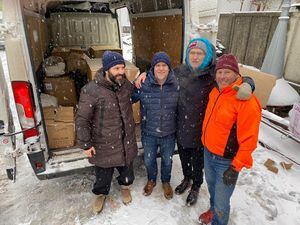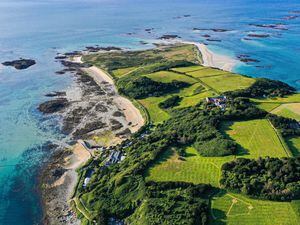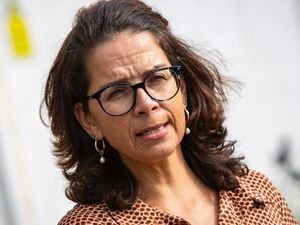‘Ukrainian spirit makes defeat seem unlikely’
THE spirit of Ukrainian people makes it hard to believe they can be beaten, two local men have said after a road trip to Lviv to deliver electricity generators.

Sustainability company owner and former States deputy Marc Laine and IT manager Nick Jenkins drove more than 1,200 miles across Europe in about 25 hours to get to the city just a few days before Christmas, arriving just an hour before a curfew came into force.
‘We were both concerned and supportive of the Ukrainian people and wanted to assist in some way,’ said Mr Laine.
In November, he created a JustGiving page after speaking to local people who knew what was required in Ukraine.
‘I understood what they were short of there, medical facilities, beds – people are sleeping on the floor – and blankets and electricity.’
Mr Laine managed to find four large diesel generators in Holland, which he paid for using donations from the public and money he had raised from selling home-made wooden snowmen.
The generators were taken to Kyiv where they are being used for field hospitals. He used the spare money to buy wood burning stoves for people in Ukraine and they also purchased hundreds of blankets when they were passing through Poland.
Originally they were going to hire a van, but were offered a more convenient solution by an islander who served in the military.
‘He offered us a van for free that he owns and keeps at Gatwick and he donated some old backpacks and things.’
Their journey took them through France, Belgium, Holland, Germany and Poland, through what they called atrocious conditions in thick snow and freezing temperatures.
When they arrived in Lviv it was 11pm on a Friday, the day after a large attack had been carried out in the city.
‘The spirit is unbelievable, it is hard to imagine they could be defeated. Every missile that lands brings them together more,’ said Mr Laine.
As curfew drew closer they noticed the bars starting to empty and groups of young people making their way home.
‘Everyone was incredibly happy to see us, they just adapt to the new normal,’ said Mr Jenkins.
‘It was hard to get food at that time of night but everyone was asking if we wanted something to eat. Ordinary life just goes on.’
While some aid delivery drivers choose to drop the supplies at the border, they wanted to take it directly to the country to avoid any delays in it arriving to those in need.
‘They almost wanted us to drive it to Kyiv. We did our own risk assessment, it was important to see things unfiltered from what we see in the popular media and see what the situation is for myself,’ said Mr Jenkins.
Windows had been sandbagged and historical monuments were either covered or had scaffolding around them to protect them from any gunfire or explosions.
However, despite seeing flashes in the sky, Mr Laine said the likelihood of being in the wrong place at the wrong time was infinitesimal.
‘It’s a city on the edge, people are so stoic and upbeat, it is not a city of miserable people, it is a country of optimists,’ he said.





